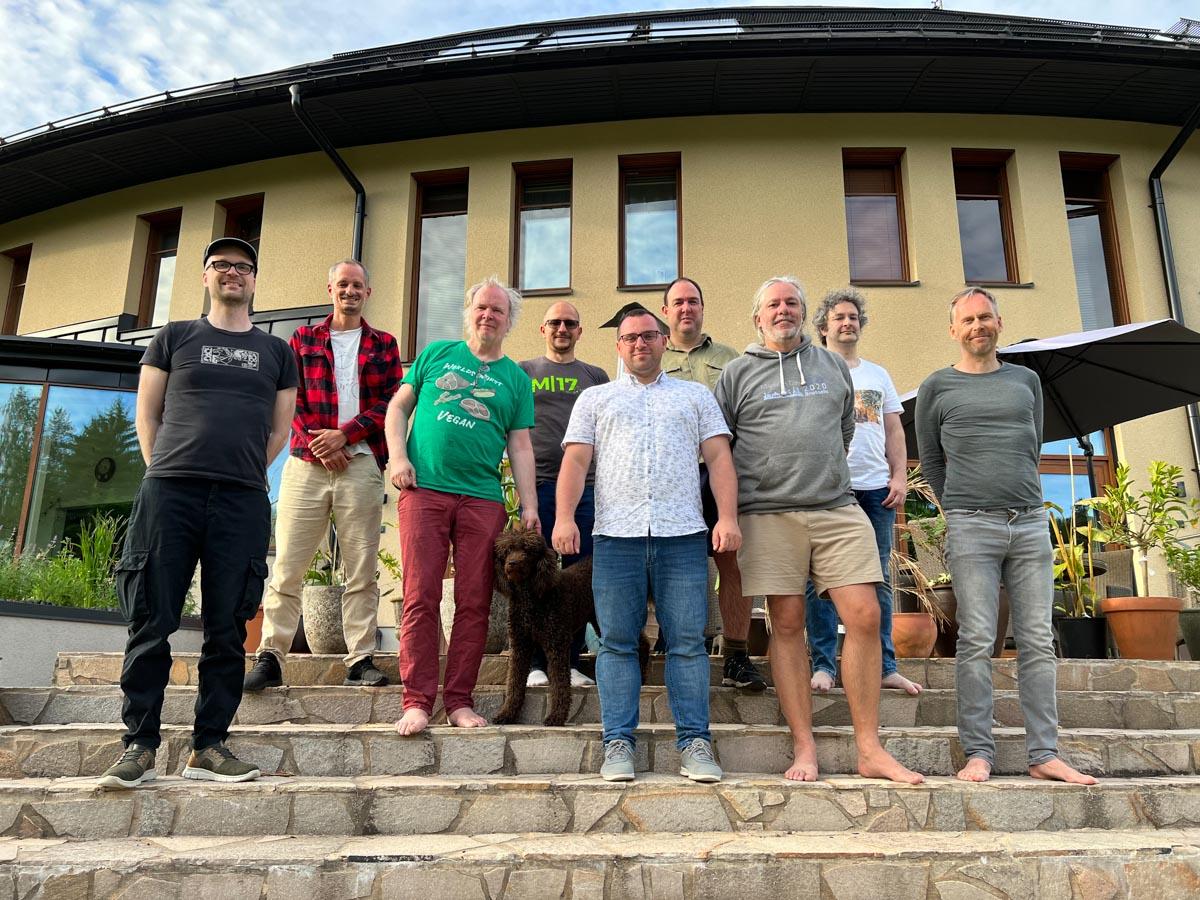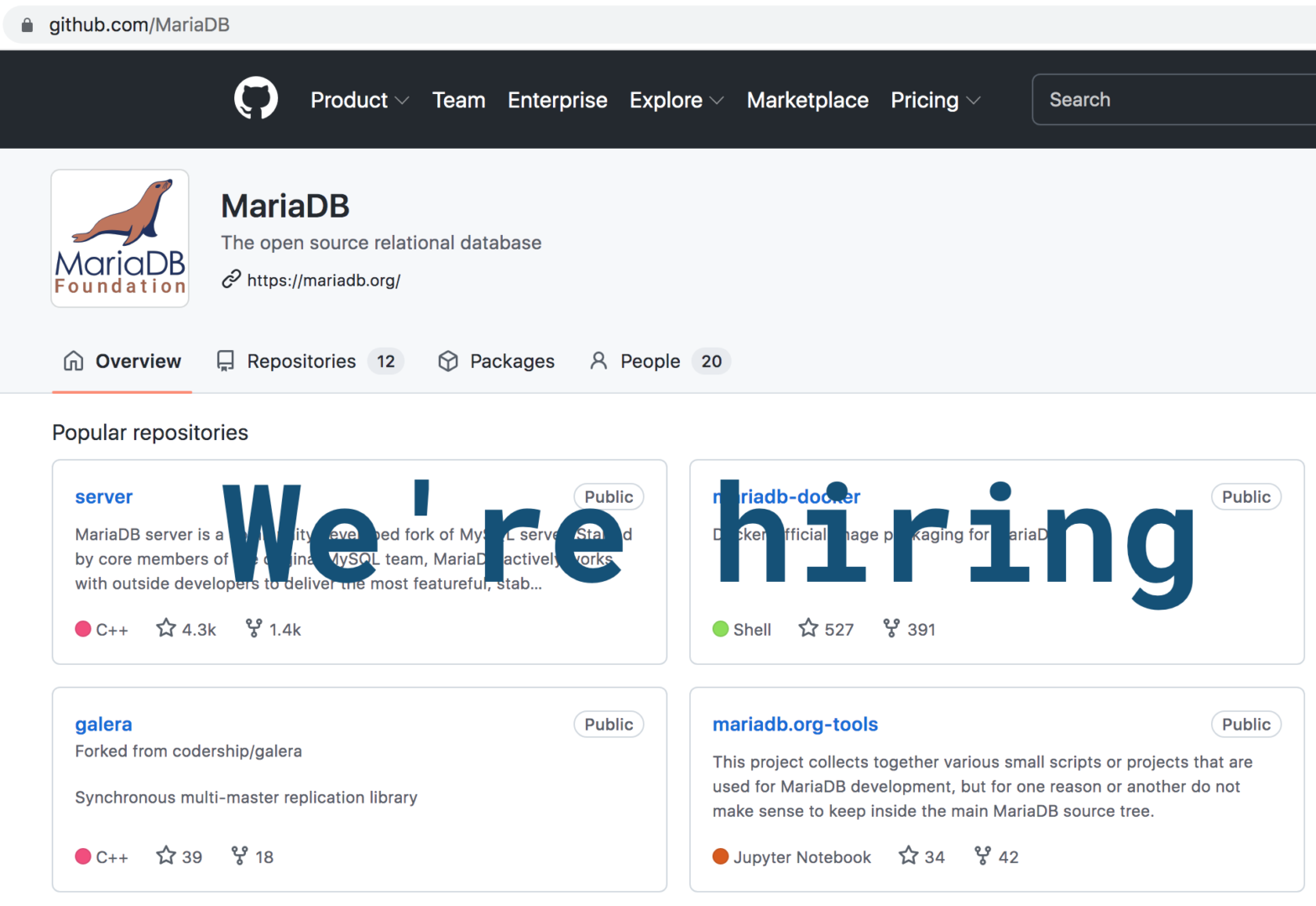The MariaDB Foundation is pleased to announce the availability of MariaDB 10.8.4 and MariaDB 10.7.5, the latest Generally Available releases in their respective short-term support series (maintained for one year from their first GA release dates), as well as MariaDB 10.6.9, MariaDB 10.5.17, MariaDB 10.4.26, MariaDB 10.3.36 the latest stable releases in their respective long-term support series (maintained for five years).
See the release notes and changelogs for details. Note that repo mirrors may take some time to sync.
Release Notes Changelog What is MariaDB 10.8?
…
Continue reading “MariaDB 10.8.4, 10.7.5, 10.6.9, 10.5.17, 10.4.26 and 10.3.36 now available”
Openness, Adoption, Continuity: That’s the mantra of three words MariaDB Foundation uses to describe its mission. At the core of Openness are contributions of code to MariaDB Server. The good news: We are now putting more resources into contributions, by hiring Andrew “LinuxJedi” Hutchings as Chief Contribution Officer, starting today Monday 15 Aug 2022.
A senior position
As you can see already from Andrew’s title, it’s a senior position. When we opened up the position, we were fully aware that only a handful of candidates can fulfil our requirements of experience on the code base.
…
In the previous blog we have seen how to create a statefulset MariaDB application. Also, we learned how replication works in MariaDB in this blog. Now, we will try to create a replicated statefulset application. As good references for creating this blog, I would like to give credit to the Kubernetes documentation as well as an example from Alibaba Cloud.
Configure replication
To replicate a MariaDB application we are going to create a statefulset that will consist of a single init container and one application container.
…
Continue reading “MariaDB & K8s: How to replicate MariaDB in K8s”
The MariaDB Foundation relies on public mirrors to distribute binaries and packages to the world. An overview of the full list can be seen at https://mirmon.mariadb.org. If you would like to volunteer to become a mirror, take a look at https://mariadb.com/kb/en/mirror-sites-for-mariadb/.
Our download page already automatically suggests one of those mirrors for you to download our binaries. Same goes for the repository configuration tool; see https://mariadb.org/download.
The purpose of this blog post is to present you a new system that we have been testing since December 2021 and that we believe is now ready for public adoption.
…
Well over two years ago was the last time the MariaDB Foundation staff had met. That was at FOSDEM, in February 2020. Thus, no big surprise, one of our topmost goals for 2022 was to have a staff meeting, face to face. It’s about time to oil the social relationships, to work together without connection issues, to be reminded of how work and life can be in a world where Covid isn’t the top issue.
In other words: we planned a post-pandemic Staff Meeting.
The outcome was different.
Choosing the venue
But let us start from the beginning, from the original euforia.
…
We are pleased to announce the fourth MariaDB series release under the new release model, MariaDB 10.10.0.
Maturing MariaDB more quickly
One of the purposes of the new model is to get features into the hands of users more quickly, in a form which supports stability by allowing the new feature to be more easily tested, separate from other new features being developed at the same time.
Candidate features for MariaDB 10.10
There are four separate preview releases, containing the following features under consideration for release in 10.10.1:
Replication
- Change defaults for CHANGE MASTER TO so that GTID-based replication is used by default if master supports it (MDEV-19801)
- Deprecate MASTER_USE_GTID=Current_Pos to favor new MASTER_DEMOTE_TO_SLAVE option (MDEV-20122)
Optimizer
- Improve optimization of joins with many tables, including eq_ref tables (MDEV-28852)
- * Table elimination does not work across derived tables (MDEV-26278)
UCA14 Collation
- Add UCA-14.0.0 collations (MDEV-27009)
- Improve contraction performance in UCA collations (MDEV-27265)
- Improve UCA collation performance for utf8mb3 and utf8mb4 (MDEV-27266)
DDL
- ALTER ONLINE TABLE (MDEV-16329)
- Atomic CREATE OR REPLACE TABLE (MDEV-25292)
Galera
- Implement a method to add IPs to allowlist for Galera Cluster node addresses that can make SST/IST requests (MDEV-27246)
Miscellaneous
- Change default of explicit_defaults_for_timestamp to ON (MDEV-28632)
- –ssl option set as default for mariadb CLI (MDEV-27105)
- Add RANDOM_BYTES function (MDEV-25704)
- The INET4 data type (MDEV-23287)
- Re-design the upper level of handling UPDATE and DELETE statements (MDEV-28883)
- Deprecate the DES_ENCRYPT/DECRYPT functions (MDEV-27104)
On the download page for 10.10.0, you will see sources in Linux (x86-64 bintar) and source formats only.
…
Continue reading “MariaDB 10.10 preview releases now available”
Yes, we are hiring!
And we are hiring for quite an interesting position: As a senior developer of MariaDB Server, with merging community code contributions as a main task.
A demanding job
This is a very demanding job. The MariaDB Server code base is large and complex, and being a good C / C++ developer is only the starting point for being able to contribute to it. You also need to understand databases, and the existing codebase architecture.
A demanding code base
The existing codebase is demanding. Depending on how you look at it, it’s either very efficient (if you know it well), or it has many dependencies (if you don’t).
…
Continue reading “We’re hiring: Senior MariaDB Developer / Code Reviewers”
In this blog we are going to demonstrate how to replicate a MariaDB database that runs in a Docker container (let’s call it primary) to one or more MariaDB servers that run in a Docker container (let’s call them replicas) using binary logging, a method that creates binary log files and an index that contains the record of all changes to the database (both data and structure). You can find an overview of how replication works here and you can find how to setup replication here. An example can be found in this GitHub script.
…


